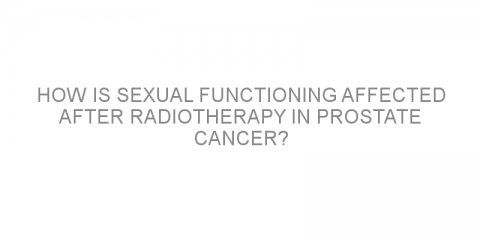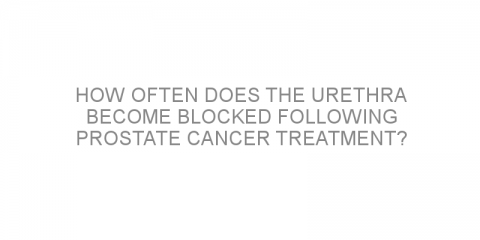In a nutshell This article compares the risk of complications following different treatment for prostate cancer; namely surgery and radiotherapy. Some background Prostatectomy is surgery to remove all or part of the prostate gland, and is one of the main treatments for prostate cancer. Radiotherapy is also often used, and this uses radiation...
Read MoreTreatment(s) already received-Radiation Posts on Medivizor
Short-term or long-term hormone therapy for prostate cancer?
In a nutshell The authors aimed to determine whether long-term hormone treatment was superior to short-term treatment when used with radiation therapy. Some background Radiotherapy and hormone therapy are common treatments used in prostate cancer patients. Radiotherapy involves directing a beam of radiation at the tumor site in order to kill...
Read MoreHow is sexual functioning affected after radiotherapy in prostate cancer?
In a nutshell The authors aimed to determine the effects of sildenafil citrate in improving sexual function after radiotherapy. Some background Radiotherapy is the use of high-energy rays to target and cure cancer with minimal damage to normal cells and is a common treatment option in prostate cancer. It can be given from outside the body or from...
Read MoreRadical prostatectomy – is accompanying hormonal treatment necessary when cancer is found in lymph nodes?
In a nutshell The authors aimed to determine outcomes in patients with whose prostate cancer has spread to the lymph nodes and were treated with prostate surgery but without accompanying hormone treatment. Some background In some patients prostate cancer tumors can spread to other parts of the body, including the lymph nodes which hold the...
Read MoreCan PSA level indicate either cure or the need for long term hormone suppression treatment?
In a nutshell This study investigated if measuring the levels of prostate specific antigen (PSA) after cancer therapy could indicate a cure or if the patient should be considered for long term androgen deprivation (suppression) therapy. The main finding was that lower PSA blood levels predict better survival in patients with prostate cancer. Some...
Read MoreFibrinogen – a new predictor in prostate cancer
In a nutshell The authors evaluated whether fibrinogen could be used to determine cancer survival in prostate cancer. Some background Fibrinogen is a very important protein that clots blood inside the body. It has previously been used to determine the metastatic potential (likelihood that the cancer cells will spread) of lung cancers and...
Read MoreClimacturia: side effect of prostate surgery
In a nutshell This study evaluated how common climacturia (urine leakage during orgasm) is in patients treated for prostate cancer. It also investigated the causes of climacturia and if it impacts on sexual satisfaction. Some background Patients with prostate cancer are commonly treated with surgery and/or radiotherapy. The success of...
Read MoreSkin-sparing mastectomy; an acceptable treatment?
In a nutshell This paper studied the outcomes of a skin-sparing mastectomy procedure. Some background More and more people are undergoing skin-sparing mastectomies. This is a treatment for breast cancer where breast tissue is removed, but the overlying skin is preserved as much as possible. It also allows for immediate breast...
Read MoreNon-metastatic prostate cancer: is having no treatment acceptable?
In a nutshell This study aimed to compare the standard of care and survival in patients diagnosed with non-metastatic prostate cancer. Some background Non-metastatic prostate cancer is cancer that has not yet spread beyond the prostate. There are several ways to treat this disease including radical prostatectomy (RP: surgical removal...
Read MoreHow often does the urethra become blocked following prostate cancer treatment?
In a nutshell The authors evaluated the prevalence and management of urethral blockage following certain cancer treatments. Some background Urethral stenosis is a medical condition characterized by a blockage in the urethra, the tube which drains fluid from the bladder to the outside of the body. The point of the blockage is referred to...
Read MoreHow should biochemical recurrence be defined after external beam radiation therapy?
In a nutshell The authors aimed to evaluate if a new definition of biochemical recurrence is appropriate in prostate cancer treated with radical external beam radiation. Some background Prostate-specific antigen is a protein that is found at higher levels in the blood when prostate cancer is present. After prostatectomy (surgery to remove the...
Read MoreIs delay of surgery after neo-adjuvant chemo-radiotherapy an effective treatment procedure?
In a nutshell The meta-analysis assessed whether a longer interval between the end of neo-adjuvant chemo-radiotherapy and surgery leads to better outcomes in treatment of rectal cancer. Some background Rectal cancer involves the final part of the large intestine, or rectum. The first choice for treatment of rectal cancer is usually surgery....
Read More











